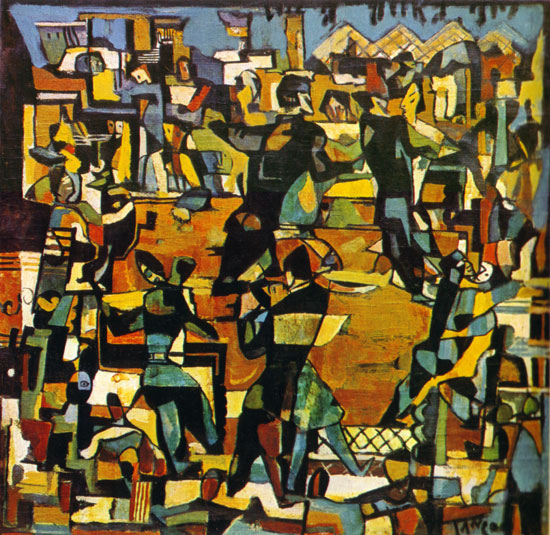Dada was an artistic and literary movement that began in 1916 in Zurich, Switzerland. It arose as a reaction to World War I, and the nationalism, and rationalism, which many thought had brought war about. Influenced by ideas and innovations from several early avant-gardes - Cubism, Futurism, Constructivism, and Expressionism - its output was wildly diverse, ranging from performance art to poetry, photography, sculpture, painting and collage. Dada's aesthetic, marked by its mockery of materialistic and nationalistic attitudes, proved a powerful influence on artists in many cities, including Berlin, Hanover, Paris, New York and Cologne, all of which generated their own groups. The movement is believed to have dissipated with the arrival of Surrealist in France.
Key Ideas
Dada was born out of a pool of avant-garde painters, poets and filmmakers who flocked to neutral Switzerland before and during WWI.
The movement came into being at the Cabaret Voltaire in Zurich in February 1916. The Cabaret was named after the eighteenth century French satirist, Voltaire, whose playCandide mocked the idiocies of his society. As Hugo Ball, one of the founders of Zurich Dada wrote, "This is our Candide against the times."
So intent were members of Dada on opposing all the norms of bourgeois culture that the group was barely in favor of itself: "Dada is anti-Dada," they often cried.
Dada art varies so widely that it is hard to speak of a coherent style. It was powerfully influenced by Futurist and Expressionist concerns with technological advancement, yet artists like Hans Arp also introduced a preoccupation with chance and other painterly conventions.
Richard Hulsenberg
Born on 23 April 1892 in Frankenau, Hessen, Germany, died 1974. Late in his life he lived in New York under the name of Charles R. Hulbeck and practised Jungian psycho-analysis. Took a prominent part in the foundation of the Zürich and Berlin dada movements. He had been an expressionist poet and writer. Came to Zürich in February 1916 as a ware-resistor and immediately came into contact with the "Cabaret Voltaire." He returned to Berlin in January, 1917, initiating the Dada group there. Hugo Ball wrote of him, in his "Escape from Time," on 11 February 1916:
Richard Hulsenberg
Born on 23 April 1892 in Frankenau, Hessen, Germany, died 1974. Late in his life he lived in New York under the name of Charles R. Hulbeck and practised Jungian psycho-analysis. Took a prominent part in the foundation of the Zürich and Berlin dada movements. He had been an expressionist poet and writer. Came to Zürich in February 1916 as a ware-resistor and immediately came into contact with the "Cabaret Voltaire." He returned to Berlin in January, 1917, initiating the Dada group there. Hugo Ball wrote of him, in his "Escape from Time," on 11 February 1916:
"Huelsenbeck has arrived. He pleads for an intensification of rhythm (Negro rhythm). He would best love to drum literature and to perdition."Edited the "Dada Almanach" in Berlin in 1920 and wrote "En Avant Dada," a history of dadaism. in the same year. The author of numerous other dada publications. He claimed throughout his life that "dada is still existing," thus placing himself in direct opposition to the other founders of dadaism.

Hiç yorum yok:
Yorum Gönder